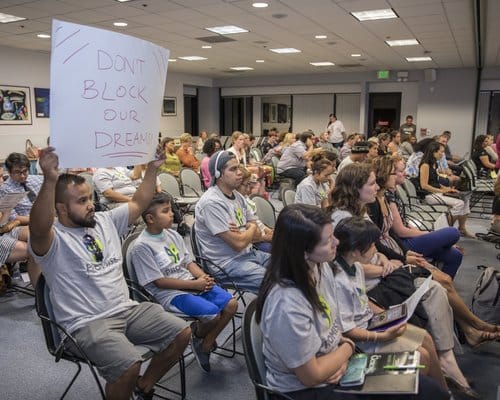PARENT EMPOWERMENT: KEY TO CHANGING EDUCATION SYSTEMS
 Over the past three decades, education entrepreneurs, parents and students have demonstrated that with the right innovations, ALL children can learn and succeed.
Over the past three decades, education entrepreneurs, parents and students have demonstrated that with the right innovations, ALL children can learn and succeed.
But, we have also discovered that the “supply” of these educational innovations cannot reach its full potential without creating “actionable demand” to remove the political and policy barriers that prevent education systems from embracing these innovations broadly.
We deliberately use the term “actionable demand” because widespread “latent demand” exists for great schools in all communities.
All communities care equally about the education and future of their children.
But caring is not the same as power.
Most parents in underperforming school systems do not possess the economic power to move to better school systems, and too few know how to activate their personal power to influence change in their current school systems.
Many communities with failing schools lack even basic information to know that their schools ARE failing and understand what policies and politics are causing this failure.
Even moderately well-performing school systems too often miss an opportunity to engage parents as partners to fully unlock the potential for students they serve.
So to be direct, turning “latent demand” into “actionable demand” is about power: Informing and organizing parents so they can exercise their innate power – individually and collectively – to create and sustain change.
A growing number of organizations are committed to creating “actionable demand” by supporting parents to employ a diverse array of empowerment strategies.
However, as a field these organizations remain highly fragmented and sub-scale relative to what is needed to drive change across 14,000+ school districts in this country – both large and small districts, and across urban, suburban and rural communities.
The parent empowerment field also remains significantly underfunded. In the United States, we spend roughly $608 billion dollars annually on K-12 education, with just 0.3% from private philanthropy, and philanthropy invests only a small fraction of that 0.3% in parent empowerment work
 As John King, the former Secretary of Education and current President and CEO of Education Trust has observed, “We are investing something like 98% of our national philanthropy in supply, and at best 2% in demand, and we’re not seeing equity-focused systems change happen quickly enough.”
As John King, the former Secretary of Education and current President and CEO of Education Trust has observed, “We are investing something like 98% of our national philanthropy in supply, and at best 2% in demand, and we’re not seeing equity-focused systems change happen quickly enough.”
While money alone does not solve problems, how it is deployed in schools, staffing, curriculum, services and programming makes all the difference between a high-performing education system and a failing one. Those who have power in school systems make decisions about that system, including allocation of resources. Right now, we underfund supporting parents to exercise their power to have a seat at the table where they can make decisions for their children, their school or their school system.
 Fortunately, parents are willing and able to fight for change. As Dawn Foye, a Boston parent, explains: “My mother says if you’re not part of the huddle, you’re not in the game. Parents are not in the game. We’re on the sidelines and we want to know how to get in.”
Fortunately, parents are willing and able to fight for change. As Dawn Foye, a Boston parent, explains: “My mother says if you’re not part of the huddle, you’re not in the game. Parents are not in the game. We’re on the sidelines and we want to know how to get in.”
 Social entrepreneurs who are building organizations in the parent empowerment space recognize this opportunity. As Maya Martin, Executive Director of DC-based Parents Amplifying Voices in Education (PAVE) shares, “It never surprises me that parents are always on the pulse of what is important for our kids and in our schools. They get it, they care, and they will show up to do the hard work. We just have to open the system to their voices.”
Social entrepreneurs who are building organizations in the parent empowerment space recognize this opportunity. As Maya Martin, Executive Director of DC-based Parents Amplifying Voices in Education (PAVE) shares, “It never surprises me that parents are always on the pulse of what is important for our kids and in our schools. They get it, they care, and they will show up to do the hard work. We just have to open the system to their voices.”

225 Franklin Street, Suite 350
Boston, MA 02110
617.912.8800
This work is licensed under a Creative Commons Attribution-NonCommercial-ShareAlike 2.0 License (CC BY-NC-SA 2.0)
Click Here to learn more.
